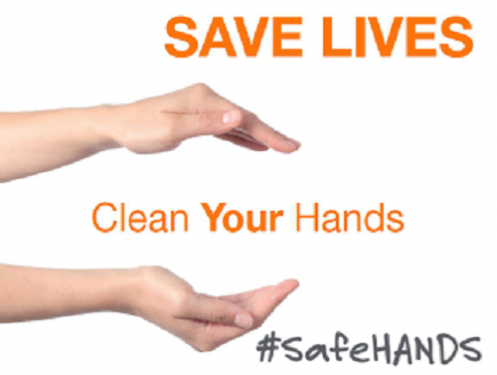Clean Hands, Save lives

Hand hygiene in healthcare is the driving force behind SAVE LIVES: Clean Your Hands campaign promoted by the World Health Organization (WHO). Healthcare associated infections are still a plague affecting millions of victims who come to hospitals to be cured without realizing hospitals may also turn into dangerous settings.
Marked on May 5 every year, this initiative is part of the First Global Patient Safety Challenge: Clean Care is Safer Care work, led by the WHO to support health-care workers to improve hand hygiene in healthcare.
Improving the hand hygiene of healthcare staff at the point of patient care will reduce healthcare associated infection as hands are a repository for microorganisms that can cause infection. Healthcare staff in all healthcare settings have the greatest chance of transferring these as they move between patients and different care activities for the same patient. National and international studies continue to reinforce the fact that infection rates can be significantly reduced by at least 15 per cent, where a strategy has been introduced to improve hand hygiene.
With the clear and central feature of the importance of clean hands in health care, the campaign aims to galvanise action at the point of care to demonstrate that hand hygiene is the entrance door for reducing health care-associated infection and increasing patient safety. It also aims to demonstrate the world's commitment to this priority area of health care.
Significant gains have been made in highlighting the need for best practice in hand hygiene over the last four years in the UK. The reduction in MRSA bacteraemia can in part be attributed to the concerted action across the NHS.
Key highlights:1. The role of hand hygiene by healthcare staff in preventing and controlling infection.
2. The point of care as the crucial moment for hand hygiene.
3. The appropriate placement of alcohol hand rub products.
4. Which hand hygiene products to use and when.
5. The current recognised standard for hand hygiene products.
6. Risk management including ingestion, storage and skin irritation.
WHO's role includes encouraging engagement and action to maintain this global movement. Numbers are a great mechanism for raising awareness, as demonstrated by the growing number of healthcare facilities registered for SAVE LIVES: Clean Your Hands, but they are not the end point. Sustaining the efforts to improve patient safety requires dedicated action and innovation, both of which are now more crucial than ever. WHO has appreciated receiving communications about country and health-care facility activities. Action must continue; use the WHO tools to support your actions.
To find out more about how to get involved and the best way of cleaning your hands to get rid of all those nasty germs, you can visit the official Save Lives Clean your Hands website.
